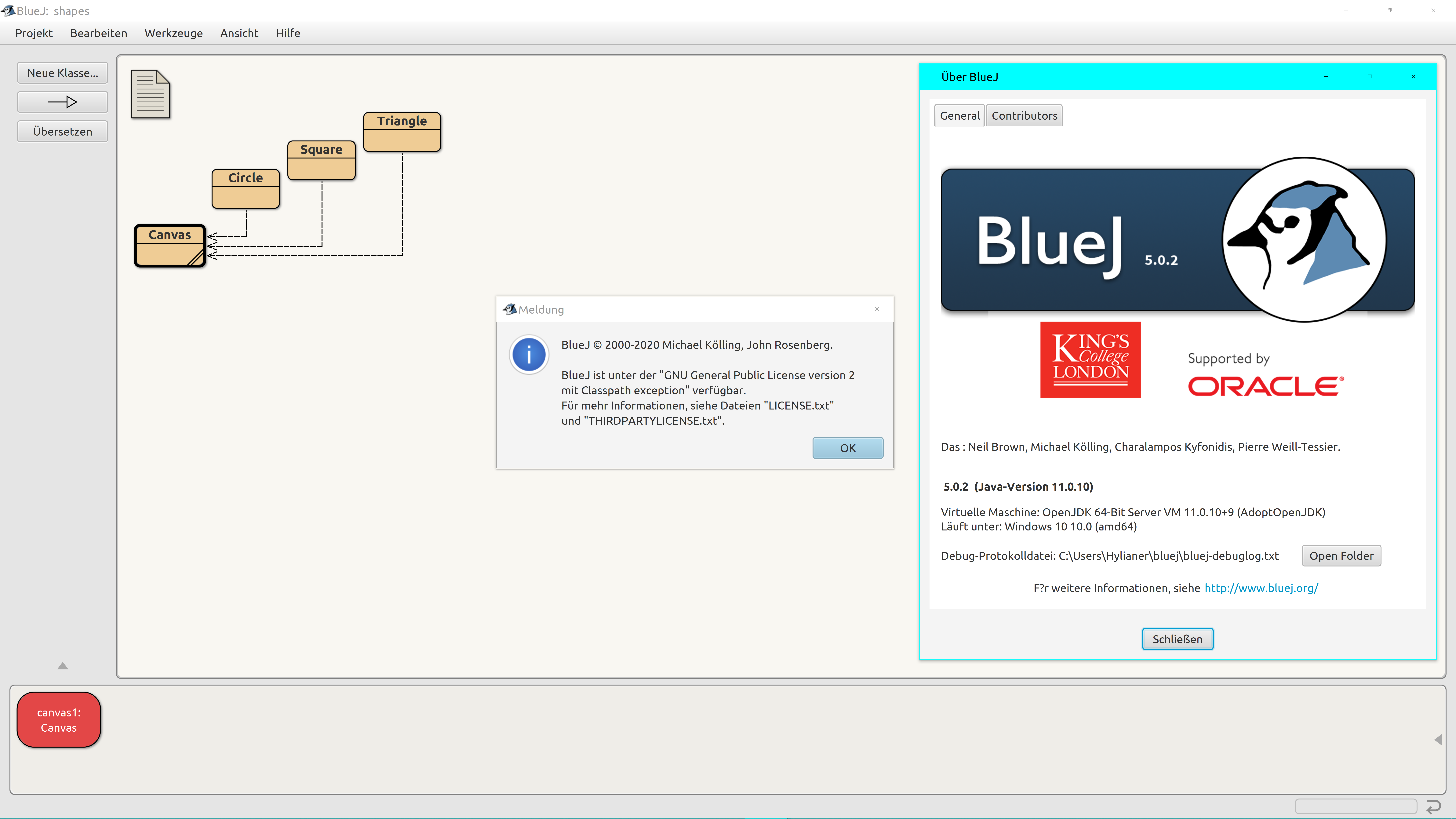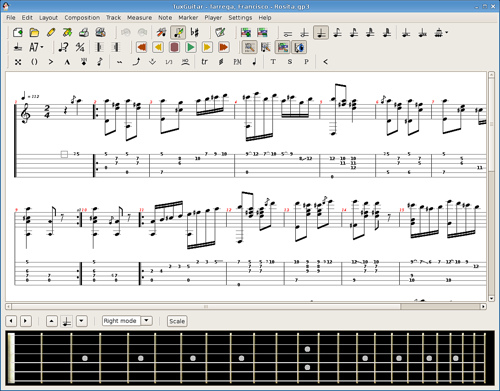|
Greenfoot
Greenfoot is an integrated development environment using Java or Stride designed primarily for educational purposes at the high school and undergraduate level. It allows easy development of two-dimensional graphical applications, such as simulations and interactive games. Greenfoot is being developed and maintained at King's College London, with support from Oracle. It is free software, released under the GPL license. Greenfoot is available for Windows, macOS, Linux, Solaris, and any recent JVM. History The Greenfoot project was initiated by Michael Kölling in 2003, and a first prototype was built by Poul Henriksen (master's student) and Michael Kölling (supervisor) in 2003/2004. From 2005 development was continued involving the other members of the BlueJ Group. Greenfoot is being developed and maintained at King's College London, where the development team moved from the University of Kent. The first full release, Greenfoot version 1.0, was published on 31 May 2006, with ... [...More Info...] [...Related Items...] OR: [Wikipedia] [Google] [Baidu] |
Michael Kölling
Michael Kölling is a German computer scientist, currently working at King's College London, best known for the development of the BlueJ and Greenfoot educational development environments and as author of introductory programming textbooks. In 2013 he received the SIGCSE Award for Outstanding Contribution to Computer Science Education for the development of the BlueJ. Education and early life Kölling was born in Bremen, Germany. He earned a degree in informatics from the University of Bremen. In 1999, he was awarded a Ph.D. in computer science from the University of Sydney, for research on the design of an object-oriented programming environment and language supervised by John Rosenberg. Career and research From 1995 to 1997 he worked at the Sydney University, followed by a position as senior lecturer at Monash University and, from 2001, a post as associate professor at the University of Southern Denmark. He worked at the School of Computing at the University of Kent, UK ... [...More Info...] [...Related Items...] OR: [Wikipedia] [Google] [Baidu] |
Frame-based Editor
A frame-based editor is a specific kind of structure editor, typically used as a source code editor for the manipulation of computer programs. Program elements are represented by ''frames'', which form the standard atomic unit of manipulation in the editor. Frames in the editor represent nodes in the underlying syntax tree of the language being written, such as simple statements, control structures, or methods, and are manipulated as single entities in the user interface. The representation of frame-based programs on screen makes use of graphical and textual elements. Most fundamentally, scope is presented by graphical boxes (the "frames" that give these editors their name), but other graphical elements, including color and graphical presentation, are also employed. Manipulation of frames in frame-based editors is typically supported equally via mouse-based gestures and keyboard manipulation. Origin The concept of Frame-based editing was developed at King's College London a ... [...More Info...] [...Related Items...] OR: [Wikipedia] [Google] [Baidu] |
BlueJ
BlueJ is an integrated development environment (IDE) for the Java programming language, developed mainly for educational purposes, but also suitable for small-scale software development. It runs with the help of Java Development Kit (JDK). BlueJ was developed to support the learning and teaching of object-oriented programming, and its design differs from other development environments as a result. The main screen graphically shows the class structure of an application under development (in a UML-like diagram), and objects can be interactively created and tested. This interaction facility, combined with a clean, simple user interface, allows easy experimentation with objects under development. Object-oriented concepts ( classes, objects, communication through method calls) are represented visually and in its interaction design in the interface. History The development of BlueJ was started in 1999 by Michael Kölling and John Rosenberg at Monash University, as a successor to ... [...More Info...] [...Related Items...] OR: [Wikipedia] [Google] [Baidu] |
Java (Sun)
Java is a set of computer software and specifications developed by James Gosling at Sun Microsystems, which was later acquired by the Oracle Corporation, that provides a system for developing application software and deploying it in a cross-platform computing environment. Java is used in a wide variety of computing platforms from embedded devices and mobile phones to enterprise servers and supercomputers. Java applets, which are less common than standalone Java applications, were commonly run in secure, sandboxed environments to provide many features of native applications through being embedded in HTML pages. Writing in the Java programming language is the primary way to produce code that will be deployed as byte code in a Java virtual machine (JVM); byte code compilers are also available for other languages, including Ada, JavaScript, Python, and Ruby. In addition, several languages have been designed to run natively on the JVM, including Clojure, Groovy, and Scala. ... [...More Info...] [...Related Items...] OR: [Wikipedia] [Google] [Baidu] |
Free Software
Free software or libre software is computer software distributed under terms that allow users to run the software for any purpose as well as to study, change, and distribute it and any adapted versions. Free software is a matter of liberty, not price; all users are legally free to do what they want with their copies of a free software (including profiting from them) regardless of how much is paid to obtain the program.Selling Free Software (gnu.org) Computer programs are deemed "free" if they give end-users (not just the developer) ultimate control over the software and, subsequently, over their devices. The right to study and modify a computer program entails that source code< ... [...More Info...] [...Related Items...] OR: [Wikipedia] [Google] [Baidu] |
Cross-platform
In computing, cross-platform software (also called multi-platform software, platform-agnostic software, or platform-independent software) is computer software that is designed to work in several computing platforms. Some cross-platform software requires a separate build for each platform, but some can be directly run on any platform without special preparation, being written in an interpreted language or compiled to portable bytecode for which the interpreters or run-time packages are common or standard components of all supported platforms. For example, a cross-platform application may run on Microsoft Windows, Linux, and macOS. Cross-platform software may run on many platforms, or as few as two. Some frameworks for cross-platform development are Codename One, Kivy, Qt, Flutter, NativeScript, Xamarin, Phonegap, Ionic, and React Native. Platforms ''Platform'' can refer to the type of processor (CPU) or other hardware on which an operating system (OS) or applicatio ... [...More Info...] [...Related Items...] OR: [Wikipedia] [Google] [Baidu] |
Stride Programming Language
Stride or STRIDE may refer to: Computing * STRIDE (security), spoofing, tampering, repudiation, information disclosure, denial of service, elevation of privilege * Stride (software), a successor to the cloud-based HipChat, a corporate cloud-based collaboration tool * Stride (game engine), a free and open-source 2D and 3D cross-platform game engine * STRIDE (algorithm), an algorithm for identifying secondary structures in proteins * Stride of an array, in computer programming * Stride scheduling, a soft real-time scheduling algorithm * System to Retrieve Information from Drug Evidence, a United States Drug Enforcement Administration database used to track the prices of drugs obtained in sting operations Music * ''Stride'' (composition), a 2019 orchestral composition by Tania León * Stride (music), a type of piano playing * "Stride", a song by Avail from their 1992 album ''Satiate'' * "Stride," a song by Canadian musician Hayden from his 1996 EP '' Moving Careful'' People * ... [...More Info...] [...Related Items...] OR: [Wikipedia] [Google] [Baidu] |
Free And Open Source Software
Free and open-source software (FOSS) is a term used to refer to groups of software consisting of both free software and open-source software where anyone is freely licensed to use, copy, study, and change the software in any way, and the source code is openly shared so that people are encouraged to voluntarily improve the design of the software. This is in contrast to proprietary software, where the software is under restrictive copyright licensing and the source code is usually hidden from the users. FOSS maintains the software user's civil liberty rights (see the Four Essential Freedoms, below). Other benefits of using FOSS can include decreased software costs, increased security and stability (especially in regard to malware), protecting privacy, education, and giving users more control over their own hardware. Free and open-source operating systems such as Linux and descendants of BSD are widely utilized today, powering millions of servers, desktops, smartphones (e.g. ... [...More Info...] [...Related Items...] OR: [Wikipedia] [Google] [Baidu] |
University Of Kent
, motto_lang = , mottoeng = Literal translation: 'Whom to serve is to reign'(Book of Common Prayer translation: 'whose service is perfect freedom')Graham Martin, ''From Vision to Reality: the Making of the University of Kent at Canterbury'' (University of Kent at Canterbury, 1990) page 36 As Martin notes "Our former Information Officer has ventured the opinion that Cranmer would not have got very high marks had this phrase appeared in an O-Level Latin paper!" , top_free_label = , top_free = , type = Public , established = , closed = , founder = , parent = , affiliation = , affiliations = Universities UKSGroup European Universities' Network EUA ACU Eastern ARCUniversities at Medway , religious_affiliation = , academic_affiliation = , endowment = £5.528 million (2018) , budget = , officer_in_charge = , chairman = , chairperson = , chancellor = Gavin Esler , president = , vice-president = , superintendent = , vice_chancellor = Karen ... [...More Info...] [...Related Items...] OR: [Wikipedia] [Google] [Baidu] |
Thesis Supervisor
A supervisor, or lead, (also known as foreman, boss, overseer, facilitator, monitor, area coordinator, line-manager or sometimes gaffer) is the job title of a lower-level management position that is primarily based on authority over workers or a workplace. A supervisor can also be one of the most senior in the staff at the place of work, such as a professor who oversees a PhD dissertation. Supervision, on the other hand, can be performed by people without this formal title, for example by parents. The term supervisor itself can be used to refer to any personnel who have this task as part of their job description. An employee is a supervisor if they have the power and authority to do the following actions (according to the Ontario Ministry of Labour): # Give instructions and/or orders to subordinates. # Be held responsible for the work and actions of other employees. If an employee cannot do the above, legally, they are probably not a supervisor, but in some other category, suc ... [...More Info...] [...Related Items...] OR: [Wikipedia] [Google] [Baidu] |
Master's Degree
A master's degree (from Latin ) is an academic degree awarded by universities or colleges upon completion of a course of study demonstrating mastery or a high-order overview of a specific field of study or area of professional practice. A master's degree normally requires previous study at the bachelor's degree, bachelor's level, either as a separate degree or as part of an integrated course. Within the area studied, master's graduates are expected to possess advanced knowledge of a specialized body of theoretical and applied topics; high order skills in analysis, [...More Info...] [...Related Items...] OR: [Wikipedia] [Google] [Baidu] |
Poul Henriksen
Poul is a Danish masculine given name. It is the Danish cognate of the name Paul. Poul may refer to: People * Poul Andersen (1922–2006), Danish printer *Poul Anderson (1926–2001), American writer * Poul Erik Andreasen (born 1949), Danish football player and manager *Poul Bang (1905–1967), Danish filmmaker *Poul Anker Bech (1942–2009), Danish painter *Poul Bjerre (1876–1964), Swedish psychiatrist *Poul Borum (1934–1996), Danish writer *Poul Bundgaard (1922–1998), Danish actor * Poul Simon Christiansen (1855–1933), Danish painter * Poul Skytte Christoffersen (born 1946), Danish diplomat * Poul Elming (born 1949), Danish opera singer *Poul Glargaard (1942–2011), Danish actor *Poul Hansen (1913–1966), Danish politician *Poul Hartling (1914–2000), Danish politician and Prime Minister *Poul Heegaard (1871–1948), Danish mathematician *Poul Henningsen (1894–1967), Danish writer and architect *Poul Richard Høj Jensen (born 1944), Danish sailor *Poul Christian ... [...More Info...] [...Related Items...] OR: [Wikipedia] [Google] [Baidu] |




